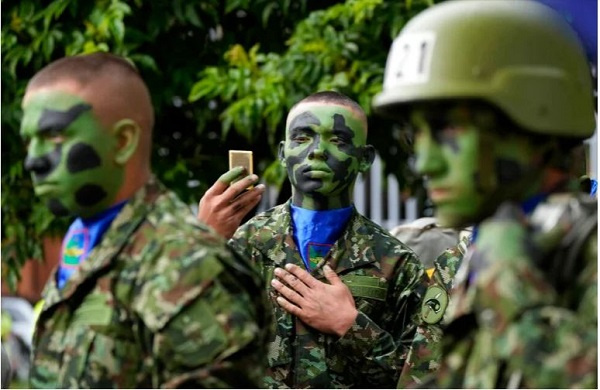 |
| Colombian soldiers during a military parade celebrating Colombia’s independence |
BOGOTA, Aug 14 (NNN-AGENCIES) — Colombian President Gustavo Petro has named new commanders for the military and the police, saying he chose the officials because they have not been accused of corruption or human rights violations.
Colombia and the National Liberation Army (ELN) rebel group also took steps on Friday to restart peace talks.
Colombia’s security forces have a long history of corruption scandals and human rights abuses committed during the country’s nearly six decades of conflict.
“The concept of human security means that success lies not in the number of dead, but in substantially reducing deaths, massacres and increasing substantially people’s liberties and rights,” Petro told a news conference to name his new officials.
Petro said his criteria for selecting the new commanders were “zero corruption, zero violation of fundamental rights”.
Enemy death tolls would cease to be a reason for the promotion of security personnel, he added.
Petro, a critic of Colombia’s military establishment and former member of the M-19 armed group, promised during his election campaign profound changes to the country’s security forces and he urged the new officials to protect life.
General Helder Fernan Giraldo was named commander of the armed forces, General Luis Mauricio Ospina is to direct the army and Vice Admiral Francisco Hernando Cubides will head the navy. General Luis Carlos Cordoba will direct the air force and General Henry Armando Sanabria the national police.
Armed conflict has plagued Colombia for almost 60 years, causing about 450,000 deaths between 1985 and 2018 alone.
Colombia’s national peace commissioner, Danilo Rueda, said that the government would take the necessary “judicial and political steps” to make peace talks possible with ELN after a meeting between the representatives of both sides in Havana, Cuba.
Observers consider it likely that those steps will include lifting arrest warrants for ELN negotiators who are currently living in exile in Cuba.
“We believe that the ELN has the same desire for peace as the Colombian government,” Rueda said in a statement. “And hope that they are listening to the many voices in different territories who are seeking a peaceful solution to this armed conflict.”
Peace talks between Colombia’s previous government and the ELN were terminated in 2019 after the rebels set off a car bomb at a police academy in Bogota and killed more than 20 cadets.
Following that incident, Colombian authorities issued arrest warrants for ELN leaders who were in Cuba for peace negotiations. But Cuba refused to extradite them, arguing that doing so would compromise its status as a neutral nation in the conflict and break with diplomatic protocols.
The United States responded by placing Cuba on its list of state sponsors of terrorism.
Petro has said he wants to start peace talks with the nation’s remaining armed groups to reduce violence in rural areas and bring lasting peace to the nation of 50 million people.
A 2016 peace deal between the government and the nation’s largest rebel group, the Revolutionary Armed Forces of Colombia (FARC), helped reduce kidnappings, homicides, and forced displacement.
But violence has picked up in some parts of the country as FARC holdouts, drug trafficking groups, and the ELN fight over cocaine smuggling routes, illegal mines, and other resources that were abandoned by the FARC.
The ELN has an estimated 2,500 fighters in Colombia. It also runs drug trafficking routes, extortion rackets, and illegal mines in neighboring Venezuela.
In July, criminal groups staged almost 90 attacks on the police and military, killing 13 police officers, according to CERAC, a think-tank that monitors violence in Colombia. That made it one of the most dangerous months for Colombia’s armed forces in the past 20 years. — NNN-AGENCIES






